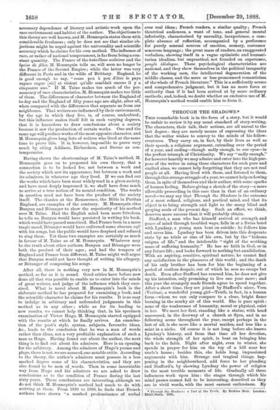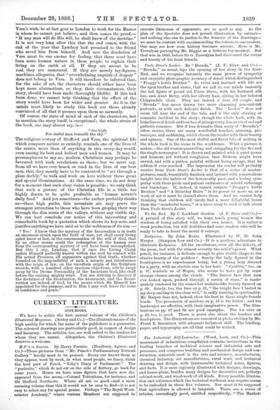11:1ROUGH THE SHADOWS.*
THIS remarkable book is in the form of a story, but it would be unfair to review it by any usual standard of story-writing. The characters, their talk, their actions, are all unreal to the last degree : they are merely means of expressing the ideas that the writer wishes to convey to the minds of his fellow- creatures. They carry on, in fact, by their lives as well as their speech, a religious argument, extending over the period of a year, and ending—though sadly enough, to our eyes—in the perfect triumph of Christianity. We say "sadly enough," for however heartily we may admire and enter into the high pur- pose of the writer in using these characters for such pure and exalted aims, we cannot help forgetting that they are not real people at all. Having lived with them, and listened to them, through this strange straggle of a year, we cannot help endowing them, in spite of themselves and their author, with some sparks of human feeling. Before giving a sketch of the story—a more allowable proceeding in this case than in that of an ordinary novel—we may say that Through the Shadows is the outcome of a most refined, religious, and poetical mind, and that its object is to bring strength and light to the many blind and groping souls of the present day. Such an effort, we think, deserves more success than it will probably obtain.
Stafford, a man who has himself arrived at strength and peace of mind through troubled ways, falls in at a Swiss hotel with Lyndsay, a young man bent on suicide : he follows him and saves him. Lyndsay has been driven into this desperate state by no trials or sins of his own, but by the "hideous enigma of life," and the intolerable "sight of the seething mass of suffering humanity." He has no faith in God, or in any future life ; and looks forward to nothing but annihilation. With an aspiring, sensitive, spiritual nature, he cannot find any satisfaction in the pleasures of this world ; and the death of his only brother has been for him the beginning of a, period of restless despair, out of which he sees no escape but death. Even after Stafford has rescued him, he does not give up his intention, only promising to live one year more ; and this year the strangely made friends agree to spend together. After a short time, they are joined by Stafford's niece, Vera (Veritas), a wonderful young girl—Truth, in fact, in a human form—whom we can only compare to a clear, bright flame burning in the murky air of this world. She is pure spirit: none of the weaknesses of humanity, moral or physical, exist in her. We meet her first, standing like a statue, with head uncovered, in the doorway of a church at Syra, and in no following scene throughout the year, except perhaps in the last of all, is she more like a mortal maiden, and less like a saint in a niche. Of course it is not long before she knows Lyndsay's history, and from that time all her devotion, the whole strength of her spirit, is bent on bringing him back to the faith. Night after night, even in winter, she spends in prayer for him on the top of a hill near her uncle's house ; besides this, she holds long, impassioned arguments with him. Strange and tragical things, hap- pening in the neighbourhood, add force to her pleading and Stafford's, by showing Lyndsay the power of religion in the most terrible moments of life. Gradually all these influences work upon him : the stages through which his mind passes cannot fail to be interesting, described as they are in vivid words, with the most earnest enthusiasm. By
* Theouoh the Shadows : a Test of the Truth. By Erskine Moir. London: Elliot Stook. 1888. Vera's wish, he at last goes to London to work for the Master in whom he cannot yet believe; and then comes the proof,— "If any man will do His will, he shall know of the doctrine." It is not very long after this that the end comes, with the end of the year that Lyndsay had promised to the friend who saved him from himself. And now the desolation of Vera must be our excuse for feeling that there must have
been some human nature in these people, to explain their living on the earth at all. If they are meant to be real, they are unnatural. If they are merely lay-figures, machines, allegories, that "overwhelming anguish of despair" does not belong to Vera. It will therefore be inferred that, for the sake of art, the characters should either have been kept mere abstractions, or, they, their circumstances, their story, should have been made thoroughly lifelike. If this had been done, we cannot help thinking that the effect of the story would have been far wider and greater. As it is, the minds most likely to study this book are those already convinced. of all that it presses upon them so earnestly.
Of course, the state of mind, of each of the characters, not to mention the story itself, is exceptional; the whole strain of the book, one may almost say, is—
"too high For sinful man beneath the sky."
The religious ecstasy of Stafford and Vera, the spiritual life which conquers nature so entirely, reminds one of the lives of the saints, more than of anything in this every-day world, even among its best and holiest men and women. It may be presumptuous to say so ; modern Christians may perhaps be favoured with such revelations as these; but we must say, from all we have ever heard, or read in the lives of our best men, that they mostly have to be contented to "see through a glass darkly," to walk and work on here without these great and special illuminations. At the same time, we do not deny for a moment that such clear vision is possible ; we only think that such a picture of the Christian life is a little too highly drawn to be quite profitable as "human nature's daily food." And yet sometimes—the author probably thinks so—these high paths, this mountain air, may prove the strongest attraction to those who have been groping their way through the dim mists of the valleys, without any visible sky. We can best conclude our notice of this interesting and remarkable book by a quotation which shows its key-note, and justifies anythingwe have said as to the nobleness of its aim :—
"Yes ! I know that the mystery of the Incarnation is in truth an enormous strain upon the faith of men, yet shall every living spirit know at last, in the consummation of the will of God, that by no other means could the redemption of the human race from the corresponding mystery of evil have been accomplished. But this I say, Lyndsay, that if once the Living Christ makes Himself perfectly known within the soul by contact with His actual Presence, all arguments against that truth, whether founded on the impossibility of such a miracle and interference with the reign of law, on the uncertain origin of the Scripture records, with a hundred other specious objections, will be swept away by the Divine Personality of the Incarnate God, like chaff before the rushing mighty wind. You are striving to discover if the doctrines of the Incarnation, the Atonement, and the Resur- rection are indeed of God, by the means which He Himself has appointed for the purpose, and to Him I may well leave the issue in confidence and peace."



































 Previous page
Previous page